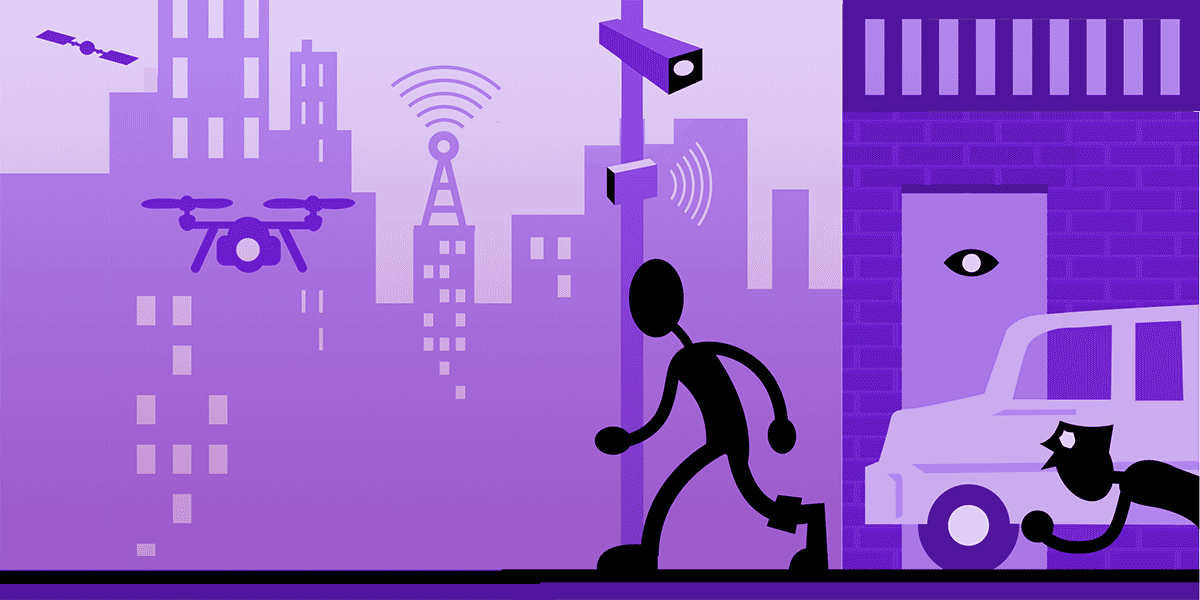|
Getting your Trinity Audio player ready...
|
Recently I got the chance to speak with longtime Electronic Frontier Alliance member Surveillance Technology Oversight Project (S.T.O.P.). They’ve got a new Advocacy Manager, Kat Phan, and exciting projects are coming down the pike! Kat took some time to share with EFF how things are looking for STOP, their many successes, education & advocacy work, and how people from across the country can plug-in and support.
Can you share how S.T.O.P. came to be, got started, and its mission?
S.T.O.P. as an organization grew from the belief that emerging surveillance technologies pose an unprecedented threat to public safety and the promise of a free society. Our executive director, Albert Fox Cahn, started S.T.O.P. in 2019 to address the long-ignored threat of state and local government surveillance. While federal advocates spent years at loggerheads over the federal surveillance powers, the growth of local police surveillance, particularly the NYPD, often went unchecked. S.T.O.P. started with an understanding that digital surveillance has played a key role in the historic criminalization of BIPOC, Muslim, and immigrant communities. Building an intersectional coalition, we began to educate New Yorkers on the disparate and discriminatory impact police surveillance has on Muslim Americans, immigrants, the LGBTQ+ community, Indigenous peoples, communities of color, and disabled people. These local collaborations, which enable us to share resources for anti-surveillance work and advocate for legislation with the support of impacted community members, form the backbone of our mission – which is to systematically dismantle the local surveillance apparatus here in New York City, as well as to build a model for dismantling local surveillance across the United States.
What have been some of the issues you’ve concentrated on and could you walk us through a timeline of some of your early successes to more recent?
Unveiling the NYPD’s sprawling surveillance systems has been a huge chunk of our work thus far. The department is notoriously opaque about the surveillance technologies at their disposal, obscuring how they disproportionately surveil Black, Latinx, and Muslim New Yorkers. One of S.T.O.P.’s earliest successes was the passage of the Public Oversight of Surveillance Technology (POST) Act, which ordered the department to disclose information about their use of surveillance to the public. The POST Act allowed S.T.O.P. and Legal Aid Society to uncover nearly $3 billion in formerly hidden NYPD surveillance contracts. However, the NYPD regularly violates the POST Act, systematically and unlawfully refusing to comply with requests for information related to its use of surveillance technology.
Our impact litigation extends beyond revealing records to the public. We have also successfully represented survivors of surveillance abuse, suing government agencies and their vendors to end surveillance practices. In 2020, we took the NYPD to court, forcing the department to end its Islamophobic “hijab ban” policy, which required arrestees to remove head coverings for mugshots and fueled the NYPD’s facial recognition database.
Establishing privacy protections around health and location data has been another major focus of our work. The year following S.T.O.P.’s launch, the Covid-19 pandemic hit. We quickly responded to New York City’s proposed contact tracing system, working to ensure that data collected to “flatten the curve” was not put to other uses or shared with law enforcement agencies or other third parties. In anticipation of the Dobbs decision in 2022, we conducted similar rapid response work, publishing Pregnancy Panopticon: Abortion Surveillance After Roe, a widely-viewed white-paper report warning pregnant people and reproductive advocates of the risks posed by digital surveillance.
Our other wins include helping outlaw K-12 facial recognition technology, drafting more than 20 bills, publishing more than 140 op-eds, drafting and releasing dozens of whitepapers, testifying before lawmakers in New York and nationally dozens of times, and more.
S.T.O.P. is getting a lot of visibility online due to your work on Voyager Labs and the NYPD. Can you shed light on this work?
Our organization found that in 2018, NYPD entered a nearly $9 million contract with Voyager Labs, an AI-based data surveillance firm which scrapes and monitors social media data. Voyager Labs claims its products can predict future crimes by using spyware, creating fake social media profiles, and making inaccurate predictions on suspects for criminal activity based on social media connections, location tracking, and other forms of data surveillance. For instance, Voyager Labs has claimed that its AI can assign prediction scores to social media users on “ties or affinity for Islamic fundamentalism or extremism” or “provide an automated indication of individuals who may pose a risk.”
In response to this, S.T.O.P. has continued to fight NYPD’s exploitation of social media monitoring and digital “stop and frisk” practices. We are a leading advocate of the “Stop Online Police Fake Accounts and Keep Everyone Safe” (STOP FAKES) Act in New York State. This first-of-its-kind legislation would ban police from leveraging fake social media accounts to surveil New Yorkers. We have also introduced a bill in the City Council which would dissolve NYPD’s so-called “gang database” and prohibit the future use of surveillance practice predicated on association.
Can you tell us about some of your other current projects?
S.T.O.P. juggles a multitude of projects developing anti-surveillance resources for local advocates and directly impacted community members. For example, Guilt By Association, a white-paper report recently released by S.T.O.P. detailing how police databases use non-criminal criteria, such as neighborhoods, peer groups, and clothing, as a reason to surveil Black and Latinx youth, supports our work with the GANGS Coalition to dissolve the NYPD database and prohibit the future use of surveillance practices predicated on association. And our latest report, The Kids Won’t Be Alright: The Looming Threat of Child Surveillance Laws, will inform the curriculum for our youth-focused privacy trainings.
What’s next on the horizon for STOP?
Our upcoming legislative work will heavily focus on passing a set of anti-surveillance and privacy laws at both the state and City Council level. At the state level, there is “Banning Big Brother: New York’s Surveillance Sanctuary State Blueprint”, a 10-bill package which includes first-in-the-nation bans on geofence warrants and fake police social media profiles. You can learn more about that campaign through its website: https://www.banbigbro.tech/.
At the local level, S.T.O.P. just relaunched our Ban the Scan campaign to introduce a city-wide ban on government use of biometric surveillance and pass two bills in the Council that would prohibit landlords and places of public accommodations from using biometric surveillance, such as facial recognition technology. You can learn more about that campaign through its website, banthescan.org, when it launches on October 17th.
Do opportunities exist for people to get involved? How can people contact and support your work?
Because our team and work thrive when we are connected to community work and can work alongside other organizations or groups similarly invested in privacy protections, S.T.O.P. welcomes collaboration on public and digital events and campaigns. For those who would prefer to be involved in our campaigns in an individual capacity, S.T.O.P. welcomes support as a volunteer, junior board member, intern, or legal fellow. We know that lived experiences are the most informative when it comes to demanding change and encourage folks from all backgrounds to join the fight to abolish all systems of mass surveillance.
What supports our work is not only direct participation as a staff member or volunteer, but donations and contributions to fuel our fight against mass surveillance (www.stopspying.org/donate). Additionally, community partnerships are key to our sustainment, and working with organizations near and far helps us share our resources and build a network of allies in our mission to end governmental abuse of surveillance technologies.



